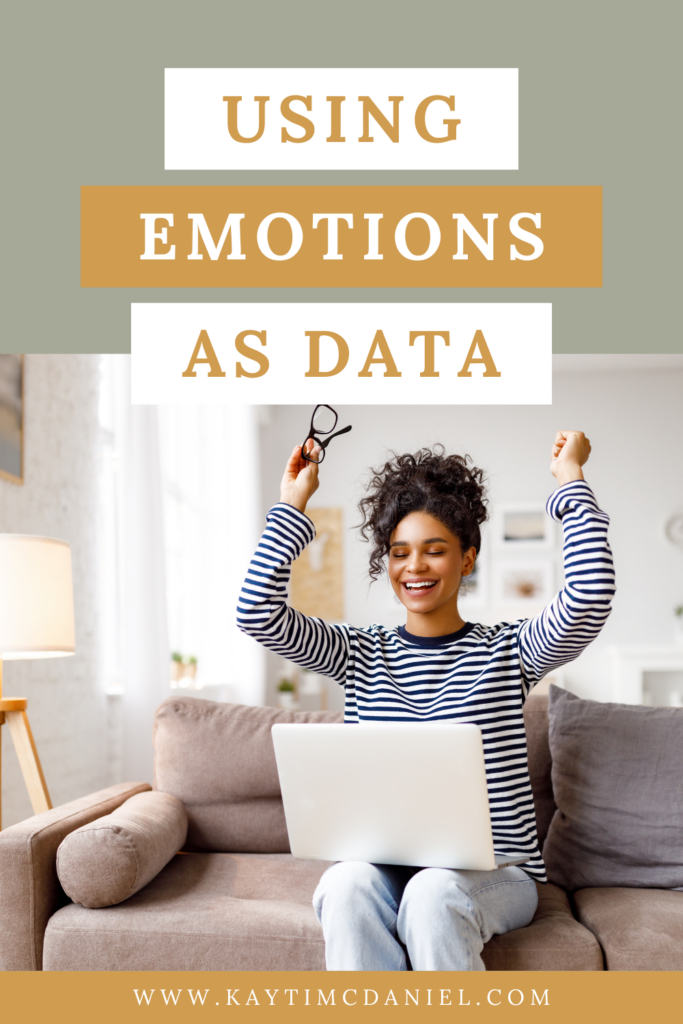
What if your emotions could give you data about what matters most to you?
Emotions can show up in a big way during the transition to parenthood. It’s easy to get lost in your emotions OR spend a lot of energy avoiding them. When you do, they can distract you from what matters most to you. But, I have some good news about your emotions. Even the uncomfortable and painful ones can actually help you clarify and focus in on what matters most to you. When you have a healthy relationship with them, you can use your emotions as data to create a meaningful life as a new parent. In this post, I’ll show you how.
Here are five questions to help you use your emotions as data for a meaningful life.
What emotions are showing up right now?
The first step to using your emotions as data is to get clear on what specific emotions you’re experiencing. Although this may sound simple, it’s not always easy. Many of us were raised in a context that communicated (whether directly or indirectly) that big feelings were unacceptable, unwelcome, or even unsafe. If that was true for you, you may have a hard time sitting with your emotions long enough to label them. And when you finally decide to try, the process may feel a little bit like learning emotions as a second language. But, like learning a second language, it’s something that will feel more natural with practice over time.
Where do you feel those emotions in your body?
The next time you’re noticing a strong emotion, pause to notice where you feel that emotion in your body. Start at the top of your head and scan all the way down to your toes. Pay attention to any physical sensations. Notice anything that feels uncomfortable (like when anxiety feels like chest pain or an upset stomach). Also notice anything that feels good (like when calm feels like nice deep breaths and relaxed arms/legs).
What stories are your emotions telling you?
With each emotion, you may notice a flood of thoughts going through your mind. This is your mind’s well intentioned effort to make sense of what you’re experiencing. When working with my clients, we’ll often describe these thoughts as “stories.” This is partially to acknowledge that thoughts are not necessarily facts — they’re just a combination of mental words and images. Sometimes, these stories have something really important to tell you. Other times, they play on repeat without saying anything new or helpful. One way to know the difference is to hear them out, at least for a moment. So imagine you could pass the mic to your emotions. What would they say? What are they worried about? What are they drawing your attention to?
What values are your emotions reminding you of?
Here’s where the emotions-as-data magic happens. When you listen carefully to the stories your emotions are telling you, you may learn (or be reminded of) what really matters to you. For example, maybe anxiety is telling you a story that your baby will get seriously injured in a car crash on your way to grandma’s house. Underneath this really scary story is a reminder that you value your baby’s safety. Or, maybe sadness is telling you a story that you are all alone. This may be sadness’s well-intentioned way of reminding you that you value connection and support.
How might you move towards those values?
Using the data you’ve gained from your emotions about your values, you can then make a game plan of practical steps for moving towards those values. For example, your value of safety can motivate you to install baby’s carseat correctly, make sure baby is buckled in, follow traffic laws, and avoid texting while driving. Your values of connection and support can motivate you to get together with a friend, spend quality time with your partner, or join a support group.
Using your emotions as data can help you create the life you want.
I hope this post gives you an idea of how you might use your emotions as data to create a meaningful life as a new parent. When you notice, feel, and listen to your emotions, you’ll see that they aren’t there just to inconvenience you. They might have something important to say.